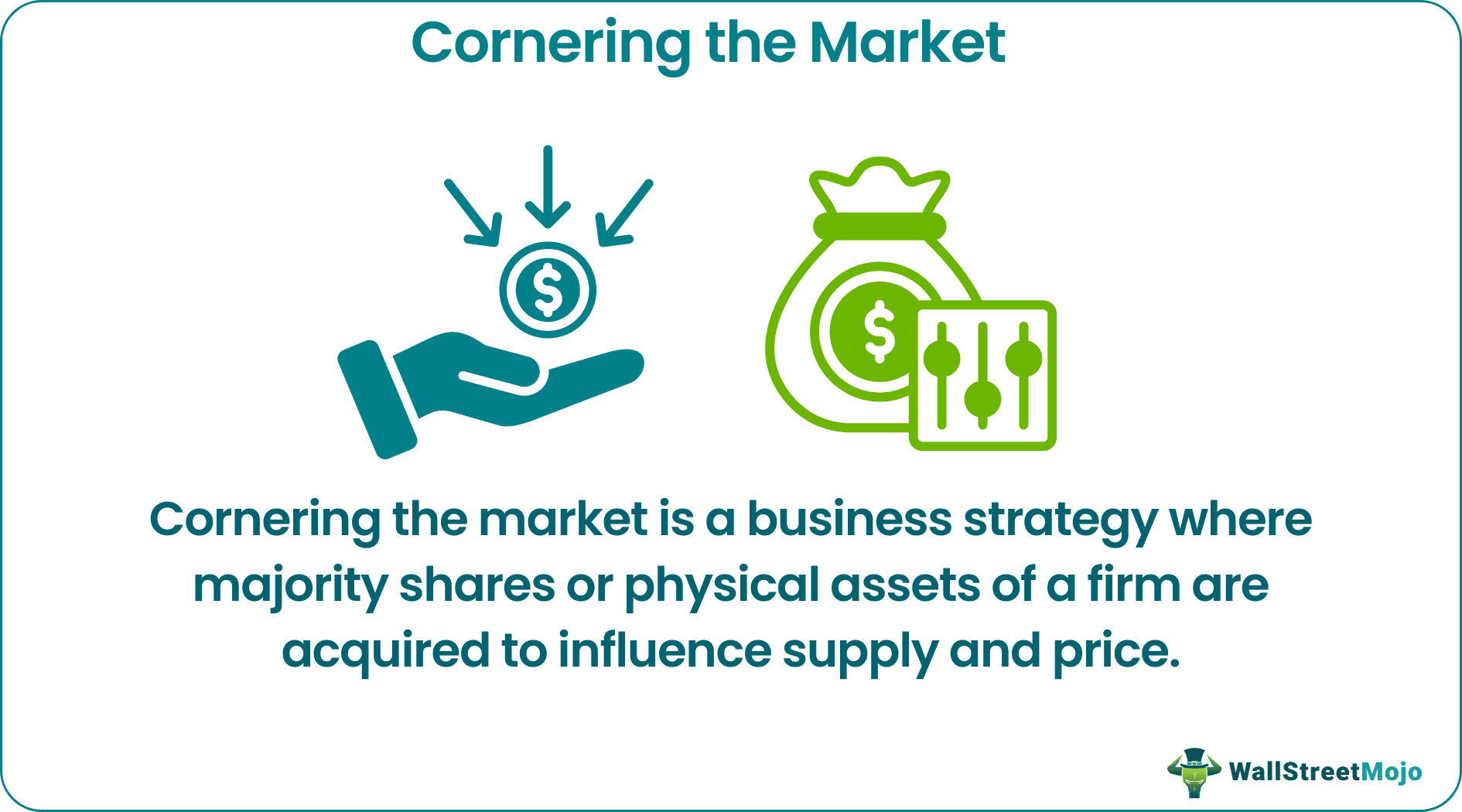Table Of Contents
Corner the Market Meaning
Cornering the market is a business strategy where an individual or a firm acquires majority shares of a particular security or asset. By doing so, the investors gains control over supply and price.
In most cases, the strategy is deemed illegal. The acquirer is able to manipulate the market—by dictating the price of the stock. The practice is called cornering because the market is set aside—there are insufficient buyers or sellers to drive security prices.
Key Takeaways
- Cornering the market is a deliberate act of owning a major stake in a company or industry. An investor purchases considerable amounts of security, asset, or commodity, to influence the price.
- To corner competitors, an individual or company must be financially competent. The individual or firm invests a huge fund to buy the majority stake.
- Hoarding stocks or commodities is one way of cornering stock exchanges. Such attempts are unlawful.
- Futures trading is a legal form of cornering, even so, it is closely monitored by regulatory authorities.
Cornering the Market Explained
Cornering the market is a business strategy—an individual or a firm purchases the majority of shares or physical assets belonging to a company. By doing so, they control supply and price.

It is a market condition where an influencer deliberately reduces stock or commodity price. The strategy can create artificial scarcity for the supply of a security or commodity—increasing the value of the commodity in the market.
In most cases, one company gains a competitive advantage by procuring a major stake (more than 70%) in competing firms. The impact of cornering is reversible—other competitors can protest. In addition, the government also imposes various regulations to correct market dominance.
Although deemed illegal, there is a legal way to corner the market—futures trading. Large corporations with sufficient funds tread this path to corner their competition. The dominant firm purchases a large number of future contracts. Due to the created shortage, the stock price rise significantly. Ultimately, the large corporation earns a hefty profit by selling acquired securities.
Many traders use Saxo Bank International to research and invest in stocks across different markets. Its features like SAXO Stocks offer access to a wide range of global equities for investors.
Cornering the Market Illegally
Cornering the market is illegal in most cases. If an investor controls the supply of security in the market to influence its price, it impacts traders' sentiments—and, therefore, is illegal.
Moreover, the Securities and Exchange Commission (SEC) monitors illegal trading practices in the security exchange, foreign exchange, and bonds markets. At the same time, Commodity Futures Trading Commission (CFTC) monitors the possible cornering of commodity markets.
Markets are supposed to be fair—providing equal opportunities for businesses to compete and grow. However, practices like cornering violate the fundamental values of free trade. By cornering, individual investors block the supply of securities or commodities for individual gains.
Hoarding is the most common trading malpractice. The hoarder purchases security or commodity in bulk quantities—acquires a major stake in it. Consequentially, the market faces an artificial scarcity—the commodity price increases rapidly.
Examples
Let us look at some examples to understand how one entity corners its competition.
Example #1
In the 1990s, Yasuo Hamanaka cornered the international copper industry. Hamanaka was a copper trader at Sumitomo Corp.
Hamanaka's unfair copper trading practice went on for ten long years—the metal price fell by one-third—the copper company lost $1.8 billion. For his notoriety, Hamanaka was later nicknamed "Mr. Copper."
Example #2
"Chocfinger" or Anthony Ward is a popular market cornering example. Anthony was the co-founder of Armajaro Holdings hedge fund. He bought 240,000 tonnes of cocoa beans on July 17, 2010.
His total investment was valued at £650 million—it led to a sharp rise in the price of cocoa beans—a record high in the last 14 years. Such malpractice creates a false impression—farmers mistook it for high demand. As a result, farmers ramped up production.
Meanwhile, Anthony Ward started selling accumulated quantities of cocoa beans. Cocoa prices shattered instantly—farmers accrued massive losses.
Disadvantages
Cornering the market poses obvious disadvantages to the competition. But, the entity that tries to corner its competition also faces certain challenges:
- Illegal Practice: Cornering is mostly seen as an unlawful act—referring to a scenario where one investor tries to control or manipulate stock prices.
- Requires Huge Fund: Cornering requires enormous funds—only wealthy individuals or companies can pull it off.
- Chances of Failure: Even after spending a considerable sum, the investor may not acquire or sustain a major stake in the security.
- Government Restriction: The government imposes various regulations and restrictions to prevent cornering.
Disclosure: This article contains affiliate links. If you sign up through these links, we may earn a small commission at no extra cost to you.
Frequently Asked Questions (FAQs)
Cornering refers to the bulk accumulation of shares of a commodity, stock, or asset in a company, or industry. By doing so, the investor corners the market—controlling security prices.
It is considered unlawful practice—an individual or company is in the position to influence and exploit asset or security prices for personal benefit. This goes against market fundamentals; it restricts free trade.
The Hunt Brothers—William Herbert Hunt, Nelson Bunker Hunt, and Lamar Hunt, cornered the silver market. However, the attempt failed—on March 27, 1980, silver price plummeted significantly.

